MusicRadar Verdict
The extra dense hardwoods produce bright, sensitive and focused sounds whichever you choose. We liked the warm Jarrah block and ply drums best, but they are all quite magnificent.
Pros
- +
Those exclusive native Australasian desert timbers are simply too gorgeous to resist.
Cons
- -
Such quality does not come cheap so be sure to choose the right wood for your style.
MusicRadar's got your back
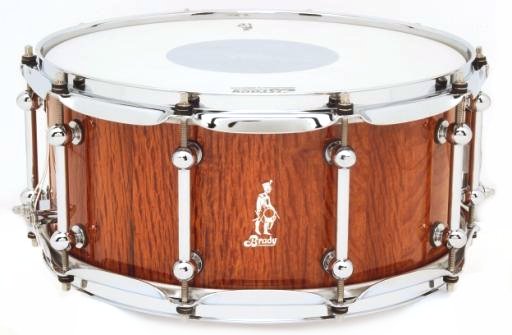
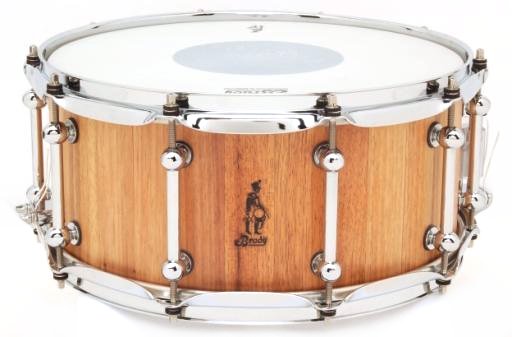
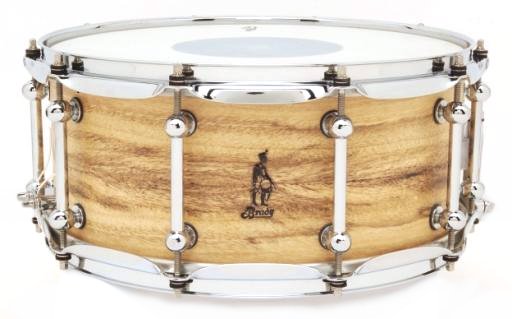
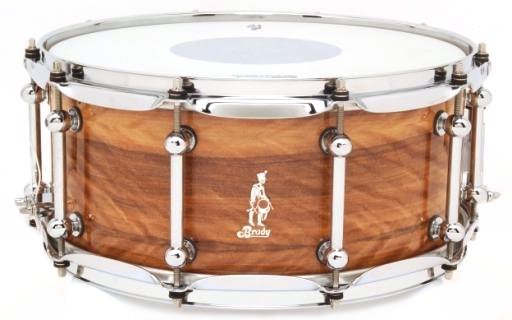
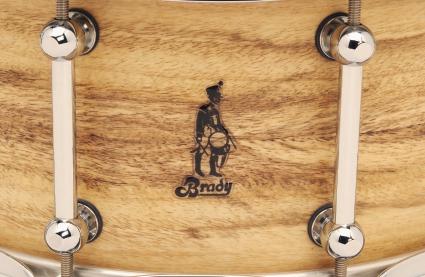
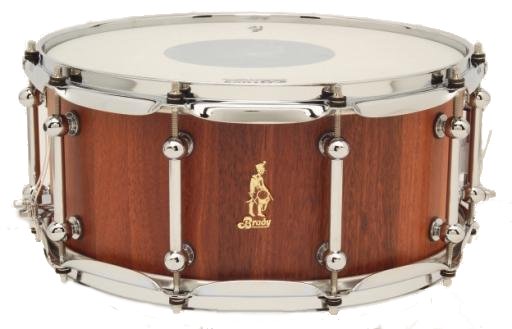
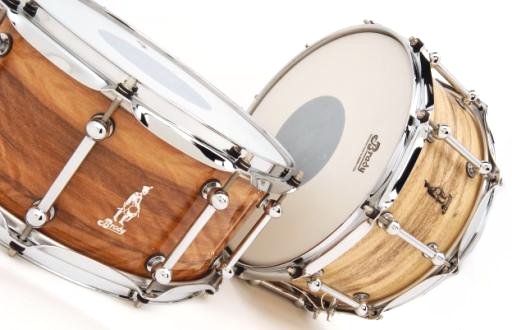
These five stunning Australian Brady snares have the same dimensions (14"x61/2") and fittings. Where they differ is in the construction and the species of timber used for each drum. Two are of ply construction while the other three are made from solid, vertically arranged blocks, half an inch thick.
Each drum has ten of Brady's custom double-ended pipe lugs, machined from solid brass. They are heavier than most tube lugs and, along with the rigid, super-hoop 2.3mm rims, considerably increase the overall weight of each drum. The stainless steel tension rods have metal washers sandwiched between two leather, shock absorbing washers to avoid metal-to-metal contact and to hold the tuning firm.
All the drums are supplied with Remo CS Coated Black Dot batters and Ambassador Hazy snare sides.
Taking the strain
Brady employs the popular nickel Drumworks piston strainer, a top quality, smooth operator. In fact, this clear version of the strainer was designed in conjunction with Brady. The chromed piston is encased in a clear moulding with a matching lever that is strong and silent.
Both the strainer and the butt end have solid chromed blocks that pull the snares well away from the drum, helping the snare to lie flat. Each drum has a proper snare bed of 1.5mm depth and the 20-strand wires are custom made for Brady using specially tempered German wire.
Exotic horizontal plies
The shells are all beautifully finished inside and out with 45º bearing edges. Brady's enviable reputation is based on the use of Australasian desert hardwoods which are harder than the familiar maple and birch of western drums. The ply construction drums are about ¼" thick, without reinforcing rings, and are unlike anyone else's as they are not cross laminated.
Instead, all the plies are laid horizontally, glued and bent in a dry mould. They are guaranteed perfectly round for life. Because all the plies run in the same direction and the glue welds the shell into a solid whole, the drums produce a sound quality very close to that of single-ply solid shell drums.
All Brady's ply drums have 10 plies, which may or may not include a special outer face veneer. For example, the jarrah ply drum has a single outer ply of brush box, while the marri ply drum is all marri, including the face veneer. The first review drum is made from jarrah ply with a brush box gloss finish, which features a wide, swirling grain varying between light and mid-brown.
The other ply drum is natural satin finished marri and is a muted golden beige with streaks of dark brown, reminiscent of an exotic animal pelt.
Jarrah ply is Brady's most popular and versatile choice. It has a good balance of attack, body, warmth and depth. It also sounds great whether it is tuned high or low. The marri ply drum is a bit more toppy. It seems a little faster, but not quite so fat, and is marginally brighter. It is a recent addition to the Brady stable and they have so far mainly used it with smaller be-bop kits. However, at 6½" this one's hardly a be-bop drum. We imagine if you're into more edgy, nimble music this would work well.
Block construction
Brady has been making tongue and groove block shells since 1999. They are twice as thick as the ply shells and correspondingly heavier. The sounds are consequently drier with fewer overtones, shorter decay and thicker tone. Brady suggests the jarrah block snare shows these characteristics most clearly. It has a short and clean note, great for the studio.
Like the jarrah ply it is warm, versatile and sensitive.
We found the sheoak drum the hardest sounding in the collection with a slight lack of warmth compared with the jarrah. It's loud, bright and aggressive with punishing rimshots.
The final drum is made from the latest addition to Brady's range, Tasmanian blackwood. This is something of a departure for Brady as it is lighter and softer compared to the previous exceptionally dense woods. The lighter wood results in a more mellow and warm character, which sounds closer to vintage American snare drums.
Visually the drums are dazzling. The Tasmanian blackwood in natural satin is actually a mid-brown colour with a relatively straight grain. The jarrah block, also in satin, is similar but with a reddish, mahogany-like tinge. Finally, the sheoak block has a recognisably oak-like grain. In the gloss finish it has a dramatic orange flame pattern, making it rather more varied than the other two.
Brady snare is an object of beauty that you will cherish for decades. Choosing the most suitable wood for your particular needs is tricky. What's certain is that the ply drums are lighter and have more resonance. Beyond that we'd recommend you be guided by Brady's own assessments of each wood. Alternatively pick the one you like the look of best and you'll probably do fine.
MusicRadar is the number 1 website for music makers of all kinds, be they guitarists, drummers, keyboard players, djs or producers...
GEAR: We help musicians find the best gear with top-ranking gear round-ups and high- quality, authoritative reviews by a wide team of highly experienced experts.
TIPS: We also provide tuition, from bite-sized tips to advanced work-outs and guidance from recognised musicians and stars.
STARS: We talk to musicians and stars about their creative processes, and the nuts and bolts of their gear and technique. We give fans an insight into the actual craft of music making that no other music website can.
“We were arguing a lot and we were miserable”: How Green Day exceeded expectations with their most ambitious song
"There’s plenty for us guitarists to learn – and ‘less is more’ is the overriding lesson": how to play like George Harrison on The Beatles' Abbey Road
“They didn’t like Prince’s bikini underwear”: Prince’s support sets for the The Rolling Stones in 1981 are remembered as disastrous, but guitarist Dez Dickerson says that the the crowd reaction wasn’t as bad as people think










